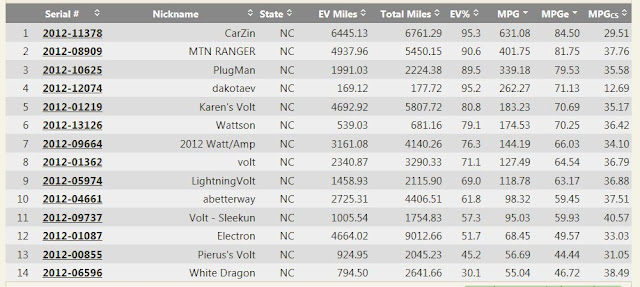In short: The Volt has been everything I had hoped it would be, and has actually exceeded my expectations. I have made arrangements through a change in parking at my workplace in order to charge during the day. I am paying for ALL of my electricity. As a result, I rarely, if ever, use gas. I am driving at the rate of about 20-23k miles per year in the first 4 months.
All the graphs and pictures you are about to see are courtesy of voltstats.net. Voltstats, through an API with On-Star, polls owner vehicles (those that have given them to permission to do so) several times a day. This data is polled straight from the car's computer.
I started letting voltstats.net collect data about 3 weeks after I had the car. The blue line is miles powered with the gas generator. The green indicates miles powered through electricity only. You will notice that since January, I have driven less than 100 miles on gas. As of this blog post, 95% of all my driving has been electric.
MY COMMUTE IS 70 MILES A DAY. THE ENTIRE COMMUTE IS ELECTRIC ONLY.
I am highlighting this point, because many people criticize the Volt's electric range when compared with other cars. The 40 mile range is entirely satisfactory to virtually all drivers, especially those that get access to charge at work. Any more battery size, in my case, would be virtually unused and a waste of my money.
Above are my actual MPG readings over the past 4 months. Since I started tracking late in January, it doesn't show much for that month. In February, when it was cold and I had to use the heater, my range suffered. I would get about 33 miles on a charge, and come in about 2 miles short to work, running on gas. That was going uphill. On the way back home, I typically would make it, even with the heater, without using gas. That is why my EV% is lower in February. When things got warmer, my range shot up dramatically. Since March, I am getting consistently over 40 miles a charge. That is with the air conditioner. The air conditioner doesnt affect range like the heater. Notice my EV percentage is nearly 100%. In fact, I went over 45 days without burning a drop of fuel. When you go 45 days without fuel, this is what the Volt wants to do:
Needless to say, this is what all Volt owners hope to see.
So, how do my numbers compare to others in my state? Let's examine that.
I am leading the charge with 640+ MPG. If I add up the others, and average, we get a NC fleet average MPG of 200 MILES PER GALLON. Why is this important? Because when you look at the various bogus payback calculators and articles for electric vehicles (especially the horrible one on the New York Times), they HEAVILY underestimate electric mile percentage. They have many other problems in their calculations, but that is a big one.
How does North Carolina compare to the 800+ national users participating in voltstats.net?
North Carolina is beating the national average. The national average is 121 MPG with about 70% of all miles being electric. There are over 4 million recorded electric miles for the Volts being monitored on voltstats, with about 5.8 million total miles.
Some of my personal achievements:
I drove over 2,800 miles without burning a single gallon of gas between 3/7 and 4/23. I was finally forced to burn a little when NC has a cold front come through, and I was forced to use a little heat.
Still going on this one. I suspect I'll get over 10,000 miles before I go through a tank of fuel. 10,000 miles.
How many miles have I managed on a single charge? Over 50!
I get more than 70 miles electric all the time. I get 95 miles every week all electric when I come home from work, plug the car up, and then go to the bowling alley two hours later. So yeah, the Volt only has 40 miles per charge. SO WHAT?
So, in my situation, what did all these electric miles cost me???
~6200 ELECTRIC MILES COST ME ~$120 IN ELECTRICITY.
In summary, while the Volt isnt for everyone, it certainly can make a difference.










While I generally agree with you, "The 40 mile range is entirely satisfactory to virtually all drivers, especially those that get access to charge at work." is a big caveat. No way I could get electricity to charge a vehicle at work...and imagine if a lot of people did...employers would not go for it.
ReplyDeleteNow I am blessed with a 12 mile commute, one way. Heck I could bike to work if I really set my mind to it.
I think you might be surprised at a lot of employers. Even the BP office in Texas installed a row of outlets for their employees. If a company like BP can support it, there is hope. In my area, there are companies like Qualcomm that have installed a bank of EIGHT charging stations. There are 12 electric cars that fight for them :) I think what we'll see is workplace charging where employees pay to charge at work, and the freebee perks for many going away. I am already paying.
ReplyDelete